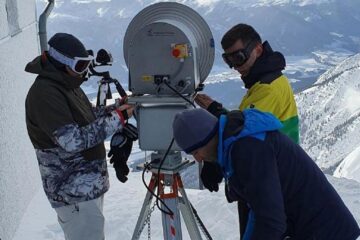ProAcademia-magazine: Cooperation across three continents in neuroscience

Those challenges can only be answered by investing in high-quality, international research in the field. NEURO, the Research Programme on Neuroscience coordinated by the Academy of Finland, brings together top neuroscientists on three continents.
NEURO is an international, jointly funded research programme of three parties: the Academy of Finland, the Institute of Neuroscience, Mental Health and Addiction (INMHA) of the Canadian Institutes of Health Research, and the National Natural Science Foundation of China.
Why, of all countries, were China and Canada selected as partners?
“Both countries are known for their high level of research in the field of neuroscience. It's always nice to work together with Canadians, because their open way of operating suits us well. China, in turn, is a rising power in the field of neuroscience in the east. Many Chinese top neuroscientists have returned to their home country in recent years,” says Programme Manager Mika Tirronen from the Academy of Finland.
The coordinators in Canada and China, too, believe that at the end of the day the cooperation will result in more than what each party could accomplish alone.
Assistant Director Astrid Eberhart of the Institute of Neurosciences, Mental Health and Addiction, Canadian Institutes of Health Research, says: “There's significant strength in the neurosciences in these three countries and the programme structure facilitates networking and encourages researcher mobility. The collaborative approach maximizes existing expertise and available funding and will provide unique opportunities for researcher training.”
Lu Rongkai from the National Natural Science Foundation of China, states: “The programme has provided a totally new mechanism for NSFC to cooperate with partner organisations from other countries. Based on our previous successful experiences as well as on the strict international review, I'm confident that the Chinese-Finnish collaboration within the neuroscience programme will be another success.”
Tools for early detection of neurodegenerative and psychiatric diseases
One of the Finnish-Chinese projects in the Research Programme on Neuroscience (NEURO) studies spontaneous brain activity and its changes. The primary goal of the consortium is to develop tools for the clinical detection of those changes.
Vesa Kiviniemi, one of the principal investigators of the research team from Oulu University Hospital, Department of Diagnostic Radiology in Finland, believes that their research findings could have a clear impact on the diagnoses and treatment of disorders, such as schizophrenia and Alzheimer's disease, which affect public health extensively.
The aim of the Finnish-Canadian research team, on the other hand, is to investigate the role of inflammation mechanisms in the onset of neuronal injury.
It is well known that a number of common nervous system diseases, for instance multiple sclerosis, are inflammation diseases. In addition, inflammation mechanisms play a key role in the pathogenetic mechanisms of Alzheimer's disease and Parkinson's disease.
The blood-brain barrier controls the entry of substances from the blood into the brain, thus protecting the central nervous system from the effects of harmful substances as well as inflammations. However, in multiple sclerosis, for instance, leukocytes penetrate the blood-brain barrier and cause the symptoms of the disease. In Alzheimer's disease and Parkinson's disease, in turn, certain resident cells of the brain are activated, thus causing neuroinflammation and, if unresolved, neuronal injury.
“Our aim in this project is to investigate the molecular mechanisms essential for leukocyte migration through the blood-brain barrier. When we get to know these mechanisms better, the next relevant question is how the migration of these cells could be prevented,” explains Professor Heikki Rauvala from the University of Helsinki, Finland, one of the principal investigators of the project.
Read more on Research Programme on Neuroscience in Academy of Finland ProAcademia-magazine in the internet. Issue 2/2006 of ProAcademia magazine is available in electronic format in the internet www.aka.fi/publications (magazines – ProAcademia)
ProAcademia is the Academy of Finland's magazine in English, published twice a year. The subjects covered in the magazine include Academy-funded research, Finnish research and science policy and the international activities of the Academy of Finland.
Media Contact
All latest news from the category: Life Sciences and Chemistry
Articles and reports from the Life Sciences and chemistry area deal with applied and basic research into modern biology, chemistry and human medicine.
Valuable information can be found on a range of life sciences fields including bacteriology, biochemistry, bionics, bioinformatics, biophysics, biotechnology, genetics, geobotany, human biology, marine biology, microbiology, molecular biology, cellular biology, zoology, bioinorganic chemistry, microchemistry and environmental chemistry.
Newest articles

Uranium-immobilizing bacteria in clay rock
Microbial reduction reduces mobility of uranium compounds. When designing repositories for high-level radioactive waste in deep geological layers, various factors must be carefully considered to ensure their long-term safety. Among…

6G mobile communications tested in the Alps
Researchers at the University of Stuttgart achieve strongest connection. Making emergency calls even in remote areas and transmitting large amounts of data in real time? This is possible with the…

Optimising inventory management
Crateflow enables accurate AI-based demand forecasts. A key challenge for companies is to control overstock and understock while developing a supply chain that is resilient to disruptions. To address this,…





















